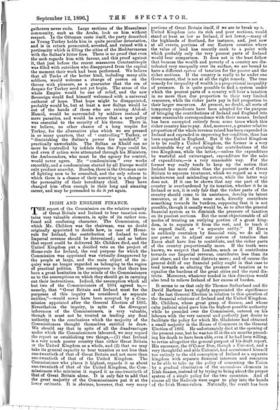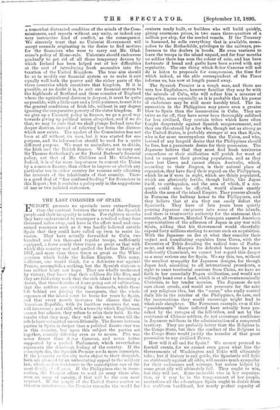IRISH AND ENGLISH FINANCE. T HE report of the Commission on
the relative capacity of Great Britain and Ireland to bear taxation con- tains very valuable elements, in spite of its rather con- fused and confusing character. The Commission, of which Mr. Childers was the chairman, was no doubt originally appointed to decide how, in case of Home- rule for Ireland, the contribution of Ireland to the Imperial revenue should be determined ; and as before that report could be delivered Mr. Childers died, and the United Kingdom put a decided veto on the project of Home-rule for Ireland, the real purpose for which the Commission was appointed was virtually disapproved by the people at large, and the main object of the in- quiry was no longer regarded as belonging to the region of practical politics. The consequence is that there has been a great hesitation in the minds of the Commissioners as to the assumptions on which they should go in carrying out their instructions. Indeed, the assumption which all but two of the Commissioners of 1894 agreed to,— namely, that "Great Britain and Ireland must for the purposes of this inquiry be considered as separate entities,"—would never have been accepted by a Com- mission appointed after the General Election of 1895. Nevertheless the inquiry, in spite of the divergent inferences of the Commissioners, is very valuable, though it must not be treated as lending any final authority to the conclusions which the majority of the Commissioners thought themselves entitled to draw. We should say that in spite of all the disadvantages under which the Commissioners laboured, we may regard the report as establishing two things,—(1) that Ireland is a very much poorer country than either Great Britain or the United Kingdom as a whole, and (2) that we may take its general capacity to bear taxation as not less than one-twentieth of that of Great Britain and not more than one-twentieth of that of the United Kingdom. The Commissioner who places it highest, regards it as about one-twentieth of that of the United Kingdom, the Com- missioners who minimise it regard it as one-twentieth of that of Great Britain alone. It is only fair to add that the great majority of the Commissioners put it at the lower estimate. It is obvious, however, that very many portions of Great Britain itself, if we are to break up ti. United Kingdom into its rich and poor sections, would stand at least as low as Ireland, if not lower,—many of the highlands of Scotland, for instance, and, just now at all events, portions of our Eastern counties where the value of land has recently sunk to a point with which probably only the very poorest parts of Ireland would bear comparison. It does not in the least follow that because the wealth and poverty of a country are dis- tributed very unequally over its surface, we are bound to have a different system of taxation for the poorer and the richer sections. If the country is really to be under one Government, that is not at all the right remedy. The true remedy for inequality of wealth is a proportional inequality of pressure. It is quite possible to find a system under which the poorest parts of a country will bear a taxation in no more than due proportion to their very limited resources, while the richer parts pay in full proportion to their larger resources. At present, no doubt, all sorts of temporary expedients have been adopted for the purpose of bringing the contributions of Ireland and England into some reasonable correspondence with their means. Ireland has been exempted entirely from some taxes which this richer country has to pay. And, moreover, a greater relative proportion of the whole revenue raised has been expended in Ireland and expended in improving her condition, than has been expended in England. But if the United Kingdom is to be really a United Kingdom, the former is a very undesirable way of equalising the contributions of the two Kingdoms, while the latter,—unless the expenditure be wasteful and extravagant, expenditure for the sake of expenditure,—is a very reasonable way. For the former way really tends to keep up the notion that Ireland has more claim than the poorest parts of Great Britain to separate treatment, which we regard as a very mischievous and misleading notion, while the latter way does not. If it can be shown that any one part of the country is overburdened by its taxation, whether it be in Ireland or not, it is only fair that the richer parts of the country should come to its assistance, develop its latent resources, or if it has none such, directly contribute something towards its burdens, supposing that it is not possible, though it usually would be, so to alter the general financial system as to diminish the pressure of taxation on its poorest sections. But the most objectionable of all modes of treating an outlying portion of a great king- dom, is to separate it from the rest, and to teach it to regard itself, as " a separate entity." If Essex is suddenly overtaken by financial ruin, we do all in our power so to adjust our system of taxation that Essex shall have less to contribute, and the richer parts of the country proportionally more. If the truth were known, we suspect that London, much as it contributes towards our Imperial revenue, contributes less than its just share, and the rural districts more ; and of course the general drift of our financial policy ought in that case to tend towards so altering the pressure of taxation as to equalise the burdens of the great cities and the rural dis- tricts. Moreover, whatever tended in this direction would also tend to relieve Ireland of her excess of burden.
It seems to us that only Sir Thomas Sutherland and Sir David Barbour have rightly appreciated the significance of the last General Election in relation to this question of the financial relations of Ireland and the United Kingdom. Mr. Childers, whose great grasp of finance, and whose calm judicial mind gave him the highest possible authority while he presided over the Commission, entered on his labours with the very natural and perfectly just desire to facilitate the policy for which Mr. Gladstone had obtained a small majority in the House of Commons in the General Election of 1892. He unfortunately died at the opening of the present year, but he was too ill in the six months preced- ing his death to have been able, even if he had been willing, to revise altogether the general purport of his draft report. His successor, the O'Conor Don, though a Unionist, and a very thoughtful and able Unionist, had accustomed himself too entirely to the old conception of Ireland as a separate kingdom with separate financial interests and resources to be able to take up the policy of cementing the Union by a gradual elimination of the anomalous elements in Irish finance, instead of by trying to bring about the proper system of a single policy for the two countries. And of course all the Radicals were eager to play into the hands of the Irish Home-rulers. Naturally, the result has been d somewhat distracted condition of the minds of the Com- missioners, and reports without any unity, or indeed any very instructive kind of conflict, as the consequence. We sincerely trust that no Unionist Government will accept counsels originating in the desire to find motives for the financiers who were to carry out Mr. Glad- stone's policy of Home-rule. Unionists should endeavour gradually to get rid of all those temporary devices by which Ireland has been helped out of her difficulties at the cost of introducing fresh anomalies into the taxation of the United Kingdom. The true aim should be so to modify our financial system as to make it suit squally well both the poorer and the richer parts of the three countries which constitute that kingdom. If it is possible, as no doubt it is, to suit our financial system to the highlands of Scotland and those counties of England where the agricultural distress is deepest, it must be quite as possible, with a little care and a little patience, to suit it to the general conditions of Irish life, without in any degree ignoring the comparative poverty of the sister kingdom. If we give up a Unionist policy in finance, we go a good way towards giving up political union altogether, and if we do that, we may be sure that we shall plunge Ireland into far deeper distress, instead of relieving her from the distress which now exists. The upshot of the Commission has not been at all without its uses, but it was started for one purpose, and its information should be used for a quite different purpose. We want to assimilate, not to divide, the Irish and the British finance. We want to carry out Sir Thomas Sutherland's or Sir David Barbour's financial policy, not that of Mr. Childers and Mr. Gladstone. Indeed, it is of far more importance to cement the Union by a common finance, than either to impose or abolish any particular tax in either country for reasons only affecting the interests of the inhabitants of that country. There is a good deal of " fine confused feeding" for financiers in this Report ; but it contains a policy only in the suggestions of one or two isolated statesmen.



































 Previous page
Previous page